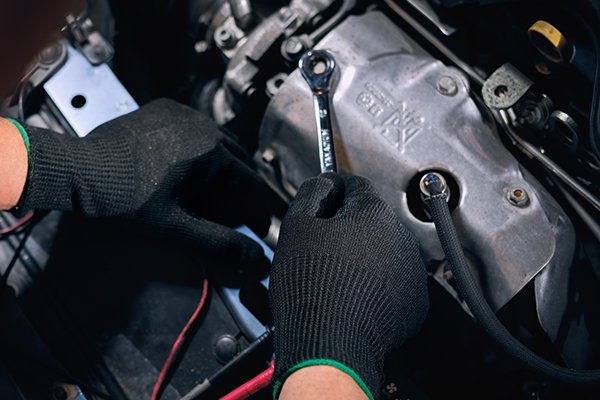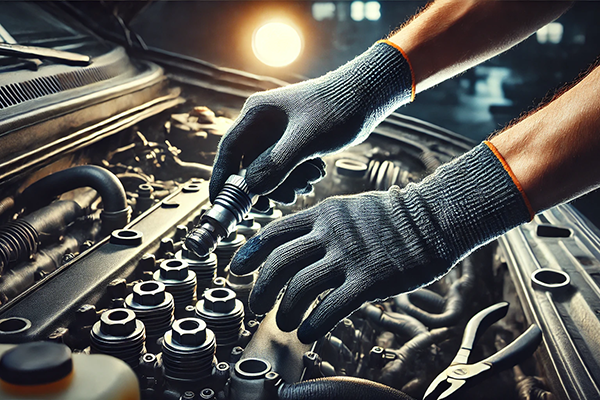What are the best work gloves for working on cars?

Are you tired of cuts, grease, and grime while working on cars? Finding the perfect gloves can be challenging. But don’t worry—I’ve got you covered.
The best work gloves for working on cars offer a balance of dexterity, protection, and grip. Look for nitrile-coated gloves1 or mechanics gloves2 with oil resistance and comfort.
Working on cars demands gloves that protect your hands without compromising precision. Let’s explore the options to find your ideal pair.
What gloves are best for working on cars?
Choosing the right gloves can make all the difference when repairing cars. With so many options available, how do you decide?
The best gloves for working on cars are nitrile-coated gloves, as they are oil-resistant, lightweight, and offer excellent grip.

-
Why nitrile-coated gloves?
They provide superior resistance to oil and chemicals, making them perfect for handling engine parts or greasy tools. -
Alternatives for specific tasks:
For electrical work, insulated gloves might be better. For heavy-duty repairs, impact-resistant gloves3 protect against bruises.
| Glove Type | Key Features | Best For |
|---|---|---|
| Nitrile-coated | Oil-resistant, tactile sensitivity | General car repairs |
| Impact-resistant | TPR protection, sturdy build | Heavy-duty repairs |
| Insulated gloves | Electric insulation | Electrical work |
What gloves do car mechanics wear?
Mechanics have specific needs when it comes to gloves. Let’s see what they use and why.
Car mechanics typically wear nitrile gloves for light work or durable mechanic gloves with padding for heavy tasks.
Mechanics balance safety with precision, often choosing gloves based on the repair task at hand.
- Disposable nitrile gloves4: Ideal for oil changes and quick fixes, these are cheap and effective.
- Padded mechanic gloves5: For extended tasks, gloves with impact-resistant padding and breathable material are preferred.
- Hybrid options6: Some gloves combine nitrile palms with fabric backs for maximum flexibility.
Should you wear gloves when working on a car?
Some people hesitate to use gloves while working on cars. But is it really necessary?
Yes, you should wear gloves when working on a car to protect against injuries, grease, and harmful chemicals.
Wearing gloves not only shields your hands but also keeps your grip steady on slippery tools and parts.
- Health protection7: Prolonged exposure to oil and chemicals can harm the skin.
- Safety assurance8: Cuts, burns, and abrasions are common without proper protection.
- Comfort factor9: Gloves with good breathability prevent sweating during long repair jobs.
Are mechanic gloves worth it?
Mechanic gloves can be more expensive than regular work gloves. Are they worth the investment?
Yes, mechanic gloves are worth it because they offer durability, specialized protection, and enhanced dexterity for automotive work.
While cheaper options exist, investing in quality gloves saves money in the long run by lasting longer and preventing injuries.
- Cost-benefit analysis: Quality gloves often cost more initially but reduce the risk of accidents and improve efficiency.
- Features that matter: Look for reinforced fingertips, oil resistance, and a snug fit for comfort.
Conclusion
Finding the best gloves for working on cars is about balancing protection and precision. From nitrile to impact-resistant gloves, there’s a perfect pair for every mechanic.
-
Discover the advantages of nitrile-coated gloves, including their oil resistance and grip, essential for automotive tasks. ↩
-
Learn about the key features of mechanics gloves that enhance safety and performance while working on cars. ↩
-
Understand the significance of impact-resistant gloves in protecting your hands during heavy-duty automotive repairs. ↩
-
Explore the advantages of disposable nitrile gloves, especially for oil changes and quick fixes, to enhance your automotive maintenance experience. ↩
-
Discover how padded mechanic gloves can improve comfort and safety during extended automotive tasks, making your work more efficient. ↩
-
Learn about hybrid gloves that combine nitrile and fabric for flexibility, perfect for various automotive tasks, ensuring both comfort and protection. ↩
-
Understanding health protection can help you choose the right gloves to safeguard your skin from harmful substances. ↩
-
Exploring safety assurance will highlight the importance of gloves in preventing injuries during tasks. ↩
-
Learning about the comfort factor can enhance your work efficiency by ensuring you choose breathable gloves. ↩



